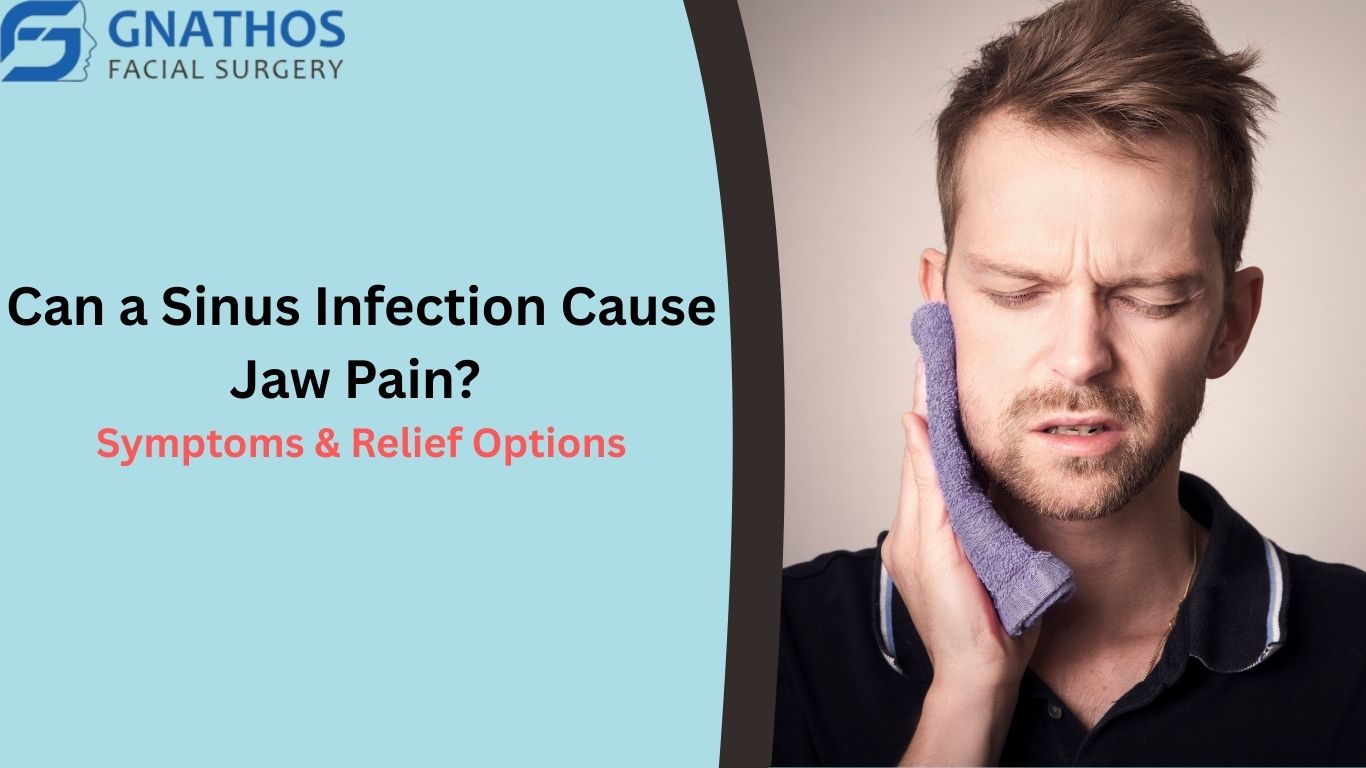You’ve probably been there: a stuffy nose, a nagging headache, maybe even a sore throat. These are all classic signs of a sinus infection. But then, to top it all off, you start feeling a dull ache or even sharp pain in your jaw, particularly in your upper teeth and cheekbones. It can be incredibly confusing, making you wonder, “Am I having a toothache? Is it my jaw joint? Or can a sinus infection cause jaw pain?“
It’s a really common question, and for good reason! The human body is a beautifully interconnected system, and what happens in one area can definitely affect another. The close proximity of your sinuses to your upper jaw and teeth means that inflammation and pressure in one can absolutely refer pain to the other. Today, we’re going to dig deep into this connection, help you understand why can a sinus infection cause jaw pain, what those symptoms feel like, and most importantly, how to find relief. Let’s get to the bottom of this discomfort together!
Understanding Your Sinuses: More Than Just a Stuffy Nose
You have four pairs of paranasal sinuses – air-filled cavities located within the bones of your skull around your nose and eyes. They’re lined with mucous membranes and tiny hairs (cilia) that help filter and warm the air you breathe, and produce mucus to trap pollutants. The ones we’re most concerned with when it comes to jaw pain are:
- Maxillary Sinuses: These are the largest sinuses, located in your cheekbones, right above your upper jaw and behind your eyes. Their close proximity to the roots of your upper back teeth (molars and premolars) is key to understanding why sinus issues can cause dental and jaw pain.
- Frontal Sinuses: Located in your forehead, above your eyes.
- Ethmoid Sinuses: Located between your eyes.
- Sphenoid Sinuses: Located deep behind your eyes, near the base of your skull.
A sinus infection, or sinusitis, occurs when these cavities become inflamed and swollen, usually due to a viral, bacterial, or fungal infection. This inflammation causes mucus to build up, leading to pressure, pain, and congestion.
Experiencing Jaw Pain with Sinus Issues?
Sinus infections can sometimes cause jaw pain and discomfort. Get the right diagnosis and relief options with expert care.
Get Relief NowThe Link: Why Can a Sinus Infection Cause Jaw Pain?
Now, let’s get to the core of your question: can a sinus infection cause jaw pain? The answer is a definitive yes, and it’s all about anatomy!
The roots of your upper back teeth (your molars and premolars) extend upward, very close to, and sometimes even into, the floor of your maxillary sinuses. When these sinuses become inflamed and filled with fluid due to an infection, the pressure inside them builds. This pressure then directly pushes down on the sensitive nerve endings within the tooth roots, leading to referred pain that feels exactly like a toothache or jaw pain.
Think of it like this: your sinus is like a balloon that’s inflating right above your teeth. As the balloon expands, it presses on everything underneath it. Your brain interprets this pressure on the tooth nerves as pain originating from the teeth or even the surrounding jawbone.
It’s important to understand that in this scenario, your teeth and jawbone themselves are perfectly healthy. The pain you feel is simply a symptom of the sinus infection, a kind of “borrowed” pain.
What Does Jaw Pain from a Sinus Infection Feel Like?
Knowing the specific characteristics of this pain can help you differentiate it from other causes of jaw discomfort. Here’s what jaw pain from a sinus infection often feels like during your day:
- Dull, Aching Pressure:
- Unlike the sharp, throbbing pain of a deep cavity, sinus-related jaw pain is often described as a dull, constant ache or a feeling of heavy pressure in your upper jaw and cheekbones. It might feel like a toothache across several upper back teeth rather than just one.
- You might feel it more intensely when you bend over, lie down, or make sudden movements, as these actions can increase the pressure within your sinuses.
- Pain in Multiple Upper Teeth:
- A key differentiator: if the pain is from a sinus infection, it typically affects several upper molars and premolars on one or both sides, rather than being isolated to a single tooth. Your teeth might feel sensitive or “long.”
- You might find that applying pressure to a single tooth doesn’t necessarily worsen the pain in the way it would with a dental issue.
- Worsens with Head Position Changes:
- This is a classic sign. Leaning forward, bending down, or lying flat can increase the pressure in your sinuses, making the jaw pain more pronounced. Standing upright might provide some relief.
- You might notice it when you wake up in the morning (after lying down all night) or when you transition from sitting to standing.
- Accompanied by Other Sinus Symptoms:
- This is the biggest clue that can a sinus infection cause jaw pain in your case. The jaw pain won’t be isolated. You’ll likely experience other tell-tale signs of a sinus infection, such as:
- Nasal congestion (stuffy nose)
- Thick, discolored nasal discharge (green or yellow mucus)
- Postnasal drip (mucus dripping down the back of your throat)
- Facial pressure and tenderness, especially around your eyes, forehead, and cheeks.
- Headache, often radiating from the forehead.
- Fatigue
- Fever (in some cases)
- Reduced sense of smell or taste.
- This is the biggest clue that can a sinus infection cause jaw pain in your case. The jaw pain won’t be isolated. You’ll likely experience other tell-tale signs of a sinus infection, such as:
- Not Worse with Hot/Cold or Chewing (Typically):
- Unlike a cavity or cracked tooth, where hot, cold, or chewing usually trigger sharp pain in a specific tooth, sinus-related jaw pain typically doesn’t react in the same way. You might have some generalized sensitivity, but intense, sharp pain from hot coffee or biting down hard on one tooth is less common.
- Unlike a cavity or cracked tooth, where hot, cold, or chewing usually trigger sharp pain in a specific tooth, sinus-related jaw pain typically doesn’t react in the same way. You might have some generalized sensitivity, but intense, sharp pain from hot coffee or biting down hard on one tooth is less common.
- May Fluctuate Throughout the Day:
- The pain might vary in intensity depending on your activity level, head position, and how much pressure is building in your sinuses. You might feel it more in the morning and less as the day progresses if drainage improves.
Experiencing Jaw Pain with Sinus Issues?
Sinus infections can sometimes cause jaw pain and discomfort. Get the right diagnosis and relief options with expert care.
Get Relief NowDifferentiating Sinus Pain from Other Jaw Pain Causes
While can a sinus infection cause jaw pain is true, it’s crucial to rule out other common culprits:
- Dental Problems: Cavities, cracked teeth, gum disease, dental abscesses, or impacted wisdom teeth can all cause significant jaw and tooth pain. These often present as localized, sharp pain in a specific tooth, often triggered by hot/cold or chewing. A dentist can rule these out.
- TMJ Disorders (TMD): Problems with your jaw joint (Temporomandibular Joint) can cause pain in the jaw, ear, and face, often accompanied by clicking, popping, or locking of the jaw. This pain is usually localized to the joint itself, just in front of your ear.
- Trigeminal Neuralgia: A neuropathic condition causing severe, electric-shock-like pain in the face.
- Muscle Tension: Stress, teeth grinding/clenching (bruxism) can cause muscle soreness and fatigue in the jaw and face, often worse in the morning.
Experiencing Jaw Pain with Sinus Issues?
Sinus infections can sometimes cause jaw pain and discomfort. Get the right diagnosis and relief options with expert care.
Get Relief NowWhen to See a Doctor: Don’t Guess, Get Checked!
If you suspect your jaw pain is related to a sinus infection, or if you’re unsure of the cause, it’s always best to see a medical professional.
Who Should You See?
- Your General Practitioner/Family Doctor: This is often your first stop for suspected sinus infections. They can diagnose and treat most acute sinus infections.
- Ear, Nose, and Throat (ENT) Specialist / Otolaryngologist: If your sinus infection is chronic, recurrent, or severe, or if your GP suspects anatomical issues with your sinuses, they will refer you to an ENT. An ENT specializes in conditions of the head and neck, including sinuses.
- Dentist: If your primary symptom is jaw or tooth pain, or if you’re unsure if it’s a dental problem or sinus-related, start with your dentist. They can perform an examination and X-rays to rule out dental issues. If they find your teeth are healthy, they’ll likely suggest it’s a sinus issue and refer you to your GP or an ENT.
- Oral and Maxillofacial Surgeon (OMS): While not typically the first point of contact for a simple sinus infection, an OMS is uniquely qualified to assess and differentiate between dental pain, TMJ pain, and sinus-related pain, especially if symptoms are complex or persistent. If a chronic sinus issue is affecting your jaw, or if a severe infection is suspected, they can work collaboratively with an ENT.
The Diagnostic Process: Getting to the Right Answer
When you visit your doctor for jaw pain potentially linked to a sinus infection, they will likely:
- Take a Detailed History: Ask about your symptoms, how long they’ve lasted, and what makes them better or worse. They’ll specifically ask about nasal congestion, discharge, and other sinus symptoms.
- Physical Examination: They will examine your face for tenderness (tapping on your cheeks and forehead), look inside your nose, and check your throat.
- Palpate Your Jaw: Gently feel your jaw muscles and TMJs to rule out other causes of pain.
- Imaging (Sometimes):
- X-rays (Sinus X-ray): Can show fluid levels in the sinuses.
- CT Scan (Computed Tomography): Provides more detailed images of the sinuses and surrounding bone structures, often used for chronic or severe infections. This is also excellent for differentiating between dental and sinus issues if there’s any ambiguity.
Relief Options for Jaw Pain from a Sinus Infection
The good news is that once the underlying sinus infection is treated, the referred jaw pain typically resolves. Here’s a breakdown of common relief options:
1. Treating the Sinus Infection (Primary Goal):
- Antibiotics: If the infection is bacterial (often suspected if symptoms last longer than 10 days, worsen after initial improvement, or are severe), your doctor will prescribe antibiotics.
- Antivirals: If it’s a viral infection, antibiotics won’t help. Treatment focuses on symptom relief.
- Antifungals: Rarely, for fungal sinusitis.
2. Symptom Relief for Sinus Congestion and Pressure:
- Decongestants: Over-the-counter nasal sprays (use cautiously and for no more than 3 days to avoid rebound congestion) or oral decongestants (like pseudoephedrine or phenylephrine) can help reduce swelling in nasal passages and relieve pressure.
- Nasal Saline Rinses: Using a neti pot or saline spray can help flush out mucus and irritants, reducing inflammation. This is incredibly effective.
- Corticosteroid Nasal Sprays: Prescription nasal sprays (like fluticasone or mometasone) can reduce inflammation in the sinus linings.
- Steam Inhalation: Inhaling steam from a bowl of hot water or a humidifier can help thin mucus and ease congestion.
- Warm Compresses: Applying a warm, moist cloth to your face (over your sinuses) can help relieve pressure and pain.
3. Pain Management for Jaw/Tooth Discomfort:
- Over-the-Counter Pain Relievers: NSAIDs like ibuprofen or naproxen, or acetaminophen, can help manage the pain and reduce inflammation.
- Prescription Pain Relievers: In severe cases, your doctor might prescribe stronger medication for a short period.
- Soft Diet: Stick to softer foods temporarily if chewing aggravates the jaw pain.
- Avoid Hard Chewing: Don’t chew gum or eat crunchy foods.
4. Home Remedies & Lifestyle Tips:
- Rest: Allow your body time to fight the infection.
- Hydration: Drink plenty of fluids to help thin mucus.
- Elevate Head: Sleeping with your head elevated can help with drainage and reduce pressure.
- Avoid Irritants: Steer clear of smoke, strong perfumes, and allergens that might worsen sinus irritation.
Experiencing Jaw Pain with Sinus Issues?
Sinus infections can sometimes cause jaw pain and discomfort. Get the right diagnosis and relief options with expert care.
Get Relief NowWhen Medical Intervention Might Be More Extensive:
If a sinus infection becomes chronic (lasting more than 12 weeks), or if it doesn’t respond to standard treatments, your ENT specialist might consider:
- CT Scan: To get a detailed picture of your sinuses and identify any anatomical blockages or areas of persistent infection.
- Endoscopy: A thin, flexible tube with a camera is inserted into your nose to visualize the sinus openings.
- Functional Endoscopic Sinus Surgery (FESS): For chronic sinusitis, surgery might be performed to open up blocked sinus passages, improve drainage, and remove diseased tissue. This is done by an ENT.
Final Thoughts: Don’t Let Pain Linger
The good news about jaw pain caused by a sinus infection is that it’s often a temporary symptom of a treatable condition. Once the sinus infection clears up, the referred jaw and tooth pain should disappear as well. However, because jaw pain can stem from many different sources – from dental issues to TMJ disorders – it’s crucial to get an accurate diagnosis. Don’t simply assume it’s “just” your sinuses, especially if the pain is severe or prolonged.
For comprehensive evaluation and precise diagnosis of any facial or jaw pain, it’s invaluable to consult with a specialist who understands the intricate connections within your head and neck. Professionals like Dr. Suresh are highly skilled in differentiating between dental, TMJ, and sinus-related pain, ensuring you receive the correct treatment. To learn more about how Dr. Suresh can help you with your jaw pain concerns and to explore available treatment options, you can visit https://gnathosface.com/. Remember, getting the right diagnosis from an experienced professional like Dr. Suresh is your best path to relief and restored comfort.
Experiencing Jaw Pain with Sinus Issues?
Sinus infections can sometimes cause jaw pain and discomfort. Get the right diagnosis and relief options with expert care.
Get Relief NowFrequently Asked Questions (FAQs)
How can I tell if my jaw pain is from a sinus infection or a toothache?
Jaw pain from a sinus infection often feels like a generalized pressure or dull ache affecting several upper back teeth on one or both sides, and it tends to worsen when you bend over or lie down. A true toothache, on the other hand, is usually a sharp, localized pain in a single tooth, often triggered by hot or cold temperatures or chewing on that specific tooth. Look for other accompanying sinus symptoms like nasal congestion, discharge, or facial pressure to help differentiate.
Will my jaw pain go away once my sinus infection clears up?
Yes, in most cases, if your jaw pain is indeed caused by a sinus infection, it should gradually subside and resolve completely once the underlying sinus infection is effectively treated and the inflammation and pressure in your sinuses decrease. The jaw and teeth themselves are usually healthy in this scenario.
What over-the-counter remedies can help with jaw pain from a sinus infection?
For jaw pain caused by a sinus infection, you can try over-the-counter decongestants (oral or nasal sprays used for short periods), nasal saline rinses (like a neti pot), and pain relievers such as ibuprofen or acetaminophen. Applying a warm, moist compress to your face can also help alleviate sinus pressure and associated jaw discomfort.
When should I see a doctor for jaw pain and a suspected sinus infection?
You should see a doctor if your jaw pain is severe, persistent, or worsens, or if your sinus symptoms don’t improve after 7-10 days, or if they initially improve and then get worse. It’s also important to seek medical attention if you have a high fever, severe headache, or swelling around your eyes, as these could indicate a more serious infection.
Can my dentist help diagnose if my jaw pain is from a sinus infection?
Yes, your dentist can play a crucial role. If your primary symptom is jaw or tooth pain, your dentist can examine your teeth and take X-rays to rule out any dental causes like cavities, cracked teeth, or abscesses. If your teeth are healthy, they might then suggest that your pain is likely sinus-related and recommend you see your general practitioner or an ENT specialist for further evaluation and treatment of the sinus infection.
Are there any long-term effects on my jaw from a sinus infection?
No, a typical acute sinus infection causing referred jaw pain usually has no long-term effects on your jawbone or teeth. Once the infection resolves, the pain should disappear, and your jaw function will return to normal. However, chronic or recurrent sinus infections that are left untreated could potentially lead to more persistent issues, though this would be managed by an ENT specialist to address the underlying sinus problem.












